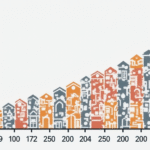Background and Relevance of the Situation
The United States Department of Transportation (DOT) has fulfilled its threat to revoke the antitrust immunity (ATI) granted to the Delta-Aeroméxico alliance. The reasons for this decision are detailed in Order 25-9-8 dated September 15, but the issue has deeper roots and is only now showing the consequences of a long series of disagreements in the current bilateral relationship, which requires significant restructuring to achieve future stability.
Current Global Context and Interdependence
The current situation in both nations is unprecedented, with polarization and geopolitical shifts leading to a new era of protectionism and an uncertain global economic order. Amidst this, Mexico must reassess many aspects to determine its role in the region. One clear aspect is the high level of integration with neighboring countries across all sectors, including aviation, migration, security, and commerce. Ignoring this interdependence is unwise, as breaking any bilateral agreement will inevitably lead to consequences for both parties.
US Sancions and Impact on the Delta-Aeroméxico Alliance
The US has imposed three sanctions that effectively nullify the 2015 agreement. First, Order 2025-7-11 requires Mexican airlines to submit their US operation schedules in advance, detailing aircraft, frequencies, timings, and airports—all subject to approval or alteration. Second, Order 2025-7-10 imposes a 30-day preapproval requirement for charter flights operated by Mexican passenger and cargo airlines, reducing the flexibility that characterizes such flights.
The aforementioned order, which cancels ATI for the Delta-Aeroméxico alliance, essentially leaves both airlines at a disadvantage. Previously, together they held 19% of the market, below American Airlines’ share. Now, each airline must independently increase its market participation without the benefits of the joint venture. This situation directly impacts ticket prices (the alliance estimates annual increases of $800 million) and deteriorates the bilateral market, affecting 40 million people and an annual exchange of around $50 billion.
Understanding the DOT’s Actions
It is essential to recognize that harm to a Mexican airline affects the entire Mexican aviation sector. The DOT’s actions demonstrate its commitment to safeguarding US airlines from unilateral decisions. This stance was clearly communicated in multiple correspondences since December 2022.
Looking Ahead: The Need for a New Agreement
Despite the 2015 agreement’s success in nearly doubling bilateral traffic and providing a nearly 4% market share boost to Mexican airlines, it is crucial not to become disconnected. A new agreement should be considered to maintain the progress made and foster continued growth in the bilateral aviation relationship.
Key Questions and Answers
- What is the main issue? The US DOT has revoked the antitrust immunity for the Delta-Aeroméxico alliance, imposing new requirements and restrictions on Mexican airlines operating in the US market.
- Why did the US take these measures? The DOT aims to protect US airlines from unilateral decisions made by foreign partners, ensuring a level playing field in the competitive aviation market.
- What are the consequences for Mexican airlines? The new regulations limit flexibility, increase operational costs, and hinder market growth, potentially leading to higher ticket prices for consumers.
- What is the significance of this bilateral relationship? The aviation sector in both countries is highly interdependent, and disruptions can have far-reaching consequences for the economy, tourism, and people-to-people connections.
- What should be the next steps? Both nations should work towards a new agreement that fosters continued growth, cooperation, and mutual benefits in the aviation sector.






